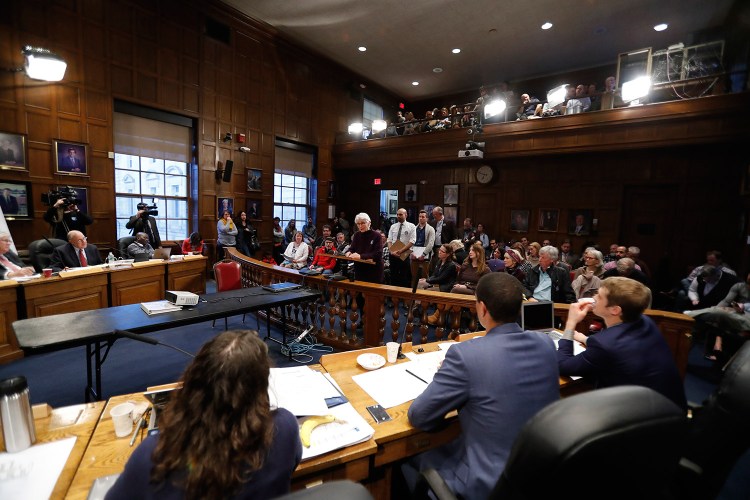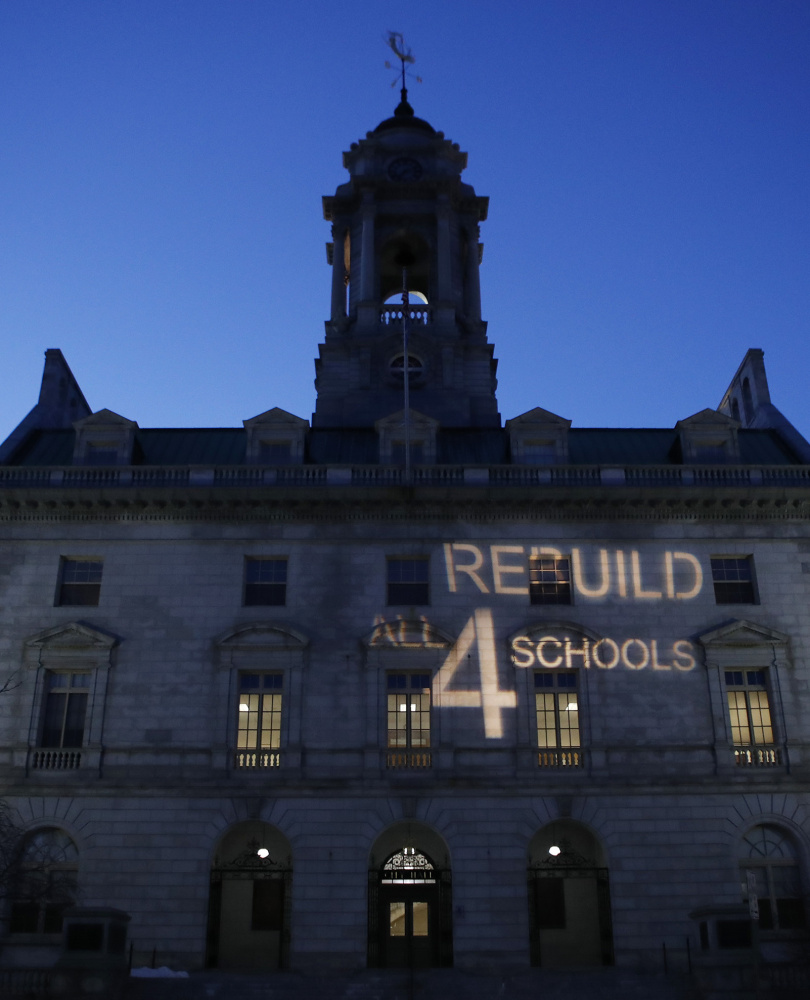A $64 million bond proposal to renovate four of Portland’s elementary schools fell short of the seven City Council votes it needed to go on the city ballot, prompting school supporters to chant “Let us vote!” as the council ended its meeting shortly before 12:30 a.m. Tuesday.
The proposal remains alive, however. According to council rules, it will continue to appear on the agenda until the council votes to approve it, kill it or reach a compromise.
Seven of the nine council votes were needed to put the borrowing plan on the ballot. Councilors Belinda Ray, Jill Duson and Nicholas Mavodones voted against it, after their efforts to preserve a chance at state funding for the renovations failed. The vote came after the council rejected a proposal to put multiple bonds before voters.
After the 7½-hour meering, Emily Figdor, a co-founder of Protect our Neighborhood Schools, a group of parents who are pushing for the bond, said supporters will hold an emergency rally at City Hall on Tuesday evening.
“This is a complete failure of leadership in our city to prioritize our schools,” Figdor said. “The minority councilors are obstructing the will of the people. It’s beyond the pale.”
During a three-hour public hearing that preceded the vote, more than 50 people urged the council to put the $64 million bond on the ballot.
Only a handful of speakers raised concerns about the impact on property taxes and asked councilors to consider alternatives that would preserve the possibility for state funding. Outside City Hall, supporters projected a message on the building’s facade that read, “Rebuild all 4 schools.”
Council and Board of Education members have been looking for over a year at ways to pay for needed upgrades at Lyseth, Presumpscot, Reiche and Longfellow elementary schools. And advocates have been campaigning for months on behalf of the borrowing plan.
Borrowed in stages over the next six years, the $64 million bond would result in an additional $92 million in debt after interest. Property taxes are projected to increase by 3.1 percent over a 26-year period, adding an average of $104 a year to the tax bill on a $240,000 home, or $2,700 over the life of the bond.
While they agree that upgrades are needed, councilors Mavodones, Duson and Ray want to preserve the possibility of securing state funding. Two of the schools – Reiche and Longfellow – barely missed the cut for state funding during the last round, and a new priority list is expected in the fall of 2018.
Mavodones, Duson and Ray proposed giving residents an opportunity to vote on three bond packages, rather than one large one.
Mavodones and Duson suggested a “2+2” proposal that would put a $32 million bond in front of taxpayers this year to renovate Lyseth and Presumpscot. If Reiche and Longfellow fail to get state funding, they would advocate for an additional bond. Their plan would not affect the timeline for completing the repairs, they say.
Ray made the case for a $24 million bond that would renovate Lyseth Elementary School, while addressing critical needs at other schools. She noted that the district-wide facility assessment was only recently made available and that the proposed $64 million bond addressed only $39 million of capital needs. She argued that the bond has been supported because the panel appointed to study it was assigned to look at only the proposal for four schools.
“It’s not a good plan to go forward,” she said.
While Mavodones and Duson applauded her proposal, it was panned by supporters of the full bond, and did not get any support from the council. The council also rejected the “2+2” plan.
Modular classrooms at Presumpscot and Lyseth force students to take additional time out of their day to use the restroom and cafeteria. Reiche school was designed without walls, so ambient noise makes it difficult for students to concentrate. And Longfellow lacks an elevator, making it impossible for students with mobility challenges to access the second floor.
Under the proposed $64 million bond, Lyseth would receive $18 million in upgrades, including a new gymnasium, additional classroom space, and additional space for art, music, library, nurses station and social work. Reiche would receive $17.2 million so classrooms can be enclosed and additional rooms can be added for pre-kindergarten and health care.
Longfellow would get $15.4 million for a new gym, Americans with Disabilities Act upgrades, asbestos abatement, improved security, and bigger rooms for reading, English language learners, gifted and talented programs, music and art, as well as more library and kitchen space. And Presumpscot would receive $13.6 million for a new gym, better security and more space for occupational therapy, physical therapy, English language learners, music and art, and for the library, kitchen and restrooms.
Proponents – parents, teachers, elected officials – wearing stickers saying “Replace all 4 Schools” in support of the bond and “No 2 + IOU” in opposition to a competing measure argued that investments are needed to improve student learning.
They begged the council to let the voters decide whether they wanted to fund repairs to all four schools, which have been studied repeatedly throughout the years.
“This onion has been peeled” said Jeanne Swanton, a West End parent. “Let’s let the voters decide now.”
Other parents called it “a gamble” and “irresponsible” for the city to hold out for state funding.
“I think waiting for state funding is crazy,” parent Michelle Welton said. “They all need help now.”
Tim Shannon said he and his wife were looking forward to enrolling their kids in Reiche – that is, until they volunteered there and saw the issues first-hand. Instead, they moved to Yarmouth, where they volunteer in the schools on a weekly basis.
Shannon said the council needs to know that people beyond Portland are following the council’s action.
“Future residents are watching,” he said. “Those parents are out there and you have the ability to attract and retain more of them.”
Only a handful of residents opposed the full bond. They worried that the bond, as well as increases in city and school budgets, would raise property taxes so much that people on fixed incomes would be priced out of the city.
Instead, they favored smaller bond proposals and potentially putting multiple bonds to voters.
Those residents included Kerri Lord, a 59-year-old retired teacher who is living on a fixed income.
“I know there are people who are getting taxed out of their properties in this city,” Lord said. “I worry about whether I’m going to be able to stay in my house for the rest of my life.”
Randy Billings can be contacted at 791-6346 or at:
Send questions/comments to the editors.





Success. Please wait for the page to reload. If the page does not reload within 5 seconds, please refresh the page.
Enter your email and password to access comments.
Hi, to comment on stories you must . This profile is in addition to your subscription and website login.
Already have a commenting profile? .
Invalid username/password.
Please check your email to confirm and complete your registration.
Only subscribers are eligible to post comments. Please subscribe or login first for digital access. Here’s why.
Use the form below to reset your password. When you've submitted your account email, we will send an email with a reset code.